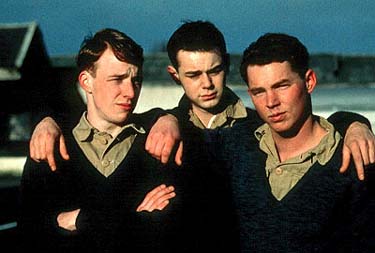 |


|
|
|
|
Film Review by John Demetry
The issue here is clarified by a line in Borstal Boy. Shawn Hatosy as Brendan Behan, the Irish author on whose memoir the film is based, explains: "An artist needs an even light." The hype machine - favoring Y tu mama tambien and ignoring Borstal Boy - serves only to obscure. Y tu mama tambien was for me, as a Queer person, the most painful and unresolved film experience of 2001. The emotional climax of Borstal Boy provides needed catharsis - an edifying emotional gestalt. Brendan discovers that his best friend - his "China" - has died during a World War II naval battle in the Pacific. He learns this from a newsreel shown to the inmates of the borstal - a reform school - where he was placed after smuggling dynamite sticks to England from Ireland as a 16-year-old member of the IRA. Brendan responds by running - Antoine Doinel-style - from the borstal. Sheridan edits this brief escape as an expressive montage. He intercuts flashbacks of the dead friend (Danny Dyer as Charlie Milwall) and shots of the newsreel projector's light with Brendan running. Sheridan makes clear Brendan's racing thoughts and the emotional process of projection. These simple cinematics successfully dramatize Brendan's sense of responsibility, grief, and too-late-realized love. It earns a quote from great Queer artists the Pet Shop Boys' "October Symphony." The young IRA revolutionary Brendan Behan makes the imaginative leap "from revolution to revelation." An artist is born. The light of the newsreel illuminates the difference between Borstal Boy and most "coming out" films or any number of hetero "coming of age" movies. If the ending of Y tu mama tambien felt like defeat, then this moment in Borstal Boy feels like hope. In short: I shared Brendan's tears.
 Robin Laing, Danny Dyer and Shawn Hatosy star in Borstal Boy
Robin Laing, Danny Dyer and Shawn Hatosy star in Borstal Boy
It's an embarrassment of modern pop culture that a critic probably needs to defend such an open emotional response to a film. The faux hope - hip nihilism - of Y tu mama tambien is simply a sad sign of the times. However, Sheridan's emotional frankness is anything but "manipulative" - the catchphrase of movie hipsters. Sheridan's montage reveals the connections of memories and feelings in Brendan's imagination. Doing so, he encourages the audience to make similar connections. He provides the imaginative tools to successfully navigate through the minefield of adolescent sex-and-politics signifiers earlier in the film. That terrain can be explosively dangerous. Sheridan finds the perfect tonal shifts to suggest this. Each moment of sexual innuendo is alternately funny or sexy or scary or some combination. Arriving in England, Brendan buys a straight porno magazine called Sex Appeal. The beginning of Borstal Boy plays like unfettered flip book of male adolescent sex-appeal fantasies.
Hatosy, as Brendan, and Dyer, as Charlie, are perfectly matched up. Delivering his Irish stutter through the side of his mouth, Hatosy conveys the thick sensuality and thin-skinned sensitivity of an Irish poet. Dyer pretends to be all come-ons and playful smiles - an astutely observed strategy of adolescent homo defenses. (Smuggling a jug of cider into the boys' sleeping quarters, he teases: "Now, put your lips around that, boys!") When Hatosy and Dyer act alone together - as after giving a performance of Oscar Wilde's The Importance of Being Earnest - both of their defenses drop. There's a palpable shift of weight in their performances. With their lips gravitating toward each other, they might be looking in the mirror. That performance of Earnest finally puts the sex-and-politics confusions into artistic perspective. Two boys, one playing a man the other playing a woman, deliver campy kisses on the cheek that elicits laughter from the borstal boys in the audience. Next, Brendan - as a man - and Charlie - as a woman - kiss in character. But it's the real deal, full-on on the lips. I don't think I've ever understood - felt! - Wilde's art of artifice as profoundly as at that moment. After the performance, Brendan tells Charlie about their stage kiss: "It felt alright because I was someone else." Charlie responds sensibly: "You can just be yourself." Did I learn something new from Borstal Boy? Probably not. However, it offers a lesson in dire need of revisiting: the importance of being earnest. That's an artistic morality, when you think about it. |

© 1997-2002 BEI
